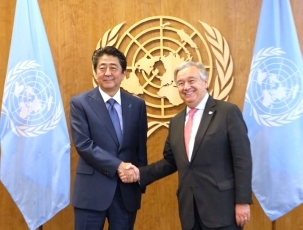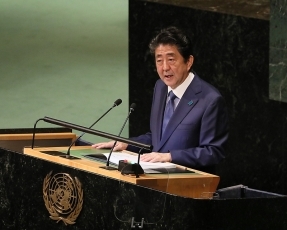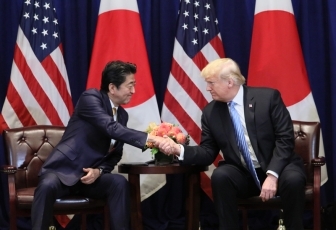Japan and the United Nations
Prime Minister Abe Attends the 73rd Session of the United Nations General Assembly
September 27, 2018
 Photo: Cabinet Public Relations Office
Photo: Cabinet Public Relations Office
 Photo: Cabinet Public Relations Office
Photo: Cabinet Public Relations Office
 Photo: Cabinet Public Relations Office
Photo: Cabinet Public Relations Office
- Mr. Shinzo Abe, Prime Minister of Japan, visited New York from Sunday, September 23 to Thursday, September 27 (local time), for the sixth year in succession in order to attend the 73rd session of the United Nations (UN) General Assembly.
- In his address to the General Debate of the UN General Assembly, Prime Minister Abe expressed his determination to focus attention on maintaining and strengthening the free-trade system and clearing away Northeast Asia's postwar structure, along with emphasizing the importance of Japan's Free and Open Indo-Pacific Strategy and expressing his conviction that Japanese people will take on responsibility for achieving the Sustainable Development Goals (SDGs), bearing in mind also the international conferences (the G20 Summit and Tokyo International Conference on African Development (TICAD) 7) that Japan will host next year.
- In addition, Prime Minister Abe held summit meetings with the leaders of the United States of America, the Republic of Turkey, the Republic of Korea (ROK) and the Islamic Republic of Iran, and also held a meeting with H.E. Mr. Ant?nio Manuel de Oliveira Guterres, Secretary-General of the UN. Furthermore, Prime Minister Abe held informal talks with the leaders of the Republic of Panama and the United Kingdom, and attended a high-level meeting titled "A Call to Invest: Investing in Youth Jobs in Africa."
1 Overview of results from major events
(1) Address to the General Debate of the UN (September 25 (New York time; the same hereafter))
The overview of Prime Minister Abe's address at the UN General Assembly is as follows.a. On September 20, I was accorded the privilege of continuing to serve as Japan's helmsman for the next three years.
b. Serving as a flag bearer for free trade.
Japan, the country that reaped the greatest benefits of all under the free trade system, will shoulder the responsibility of maintaining and strengthening that system.Japan quickly approved the Trans-Pacific Partnership (TPP) 11 in its Diet, and the Japan-European Union (EU) Economic Partnership Agreement (EPA) has also been signed.
- Japan is committed to the World Trade Organization (WTO), and will make an all-out effort towards negotiations on the Regional Comprehensive Economic Partnership (RCEP), which will give rise to an enormous free-trade area in East Asia.
- I value our new trade talks with the United States (dubbed the "FFR" trade talks).
c. Clearing away Northeast Asia's postwar structure.
I will do everything in my power to clear the long-standing postwar structure from Northeast Asia.- The conclusion of a peace treaty between Japan and Russia will create a more certain cornerstone for the peace and prosperity of East Asia.
- Japan's policy of seeking to settle the unfortunate past and normalize its relations with North Korea once the abductions, nuclear, and missile issues are resolved will not change.
- The mutual visits between the leaders of Japan and China will add another axle for stability to the region.
d. Promoting the "Free and Open Indo-Pacific Strategy".
It will become increasingly important to preserve the peace and stability of free and open seas in the Indo-Pacific region, which runs from the Arctic Ocean to the Sea of Japan, through the Pacific Ocean to the Indian Ocean.- Japan will contribute to an open maritime order based on the rule of law, along with all countries and peoples who share the same intent.
e. Inviting teachers from Gaza.
From the beginning of 2019, we will invite approximately 10 elementary and junior high school teachers from the Gaza Strip to Japan every year.- In the future, this program will impart a means of hope to the teachers who have visited Japan from Gaza and their thousands of students.
f. Japan and the Japanese people looking intently at the future.
I will create an environment that encourages the young people who will live in Japan of the future to vigorously take on challenges.- Next year Japan will host the G20 Summit (in June), the Seventh Tokyo International Conference on African Development (TICAD 7) (in August), and the Rugby World Cup, and in 2020 Tokyo will host the Olympic and Paralympic Games.
- Japanese people who are looking intently at the future will become people who determinedly take on responsibility for achieving the SDGs.
- Japan, together with Secretary-General Guterres, will push forward with the reform of the Security Council and the reform of the United Nations.
(2) Bilateral meetings etc.
(a) Japan-U.S. Dinner Meeting (September 23) / Japan-U.S. Summit Meeting (September 26)
Following the most recent Inter-Korean, U.S.-Republic of Korea (ROK), and Japan-ROK Summit Meetings, the two leaders closely aligned their future policies concerning the issue of North Korea once again. The leaders also confirmed their shared goal of achieving the full implementation of the relevant United Nations Security Council (UNSC) resolutions.The leaders shared the view that Japan and the U.S, as well as Japan, the U.S, and ROK, will continue to coordinate closely to further build upon the momentum created by the U.S.-North Korea Summit in June towards the denuclearization of the Korean Peninsula. With respect to the abductions issue, Prime Minister Abe conveyed the strong earnest message from the families of the abductees to President Trump. President Trump leaned forward, listened intently and stated once again that he had strongly conveyed the views of Japan to Chairman Kim Jong Un. In addition, the two leaders once again shared the view that Japan and the U.S. would continue working together to resolve the abductions issue.
The two leaders agreed to enter into negotiations for a Japan-U.S. Trade Agreement on goods (TAG), based on the view that further reinforcing economic ties between Japan and the U.S. would expand bilateral trade in a stable manner and contribute to free and open development of the global economy, and issued the Joint Statement. The leaders also shared the view that they would further expand trade and investment between Japan and the U.S. in a mutually beneficial manner, and realize economic development in the Indo-Pacific region that is free, open, and based on fair rules.
The two leaders praised the concrete cooperative projects in third countries to advance their shared vision to maintain and promote a free and open Indo-Pacific. They also reaffirmed their strong determination to further enhance cooperation in wide-ranging areas in the Indo-Pacific region.
(b) Japan-Turkey Summit Meeting (September 24)
President Erdoğan expressed his appreciation for the Prime Minister's congratulatory telephone call following the Turkish presidential election in June. In addition, President Erdoğan welcomed the recent visit to Turkey by Her Imperial Highness Princess Akiko and congratulated Prime Minister Abe on his victory in the presidential election of the Liberal Democratic Party (LDP) on September 20. In response, Prime Minister Abe thanked the President for the congratulations on the Prime Minister's presidential election victory, and stated that the relationship between Japan and its strategic partner Turkey has been steadily deepened on all fronts in politics, economy, culture, and disaster risk reduction. Prime Minister Abe explained that he hopes to further strengthen the cooperative relationship under the strong leadership of President Erdoğan, based on Turkey's new presidential system of government. The two leaders welcomed the Japan-Turkey Business Council Joint Meeting that was recently held for the first time in three years, along with confirming that they will aim to further strengthen the Japan-Turkey economic relationship through such measures with the aim of reaching an early agreement on the Japan-Turkey Economic Partnership Agreement (EPA). In addition, the two leaders confirmed that they will pursue cooperation in a broad range of fields, including the Turkish-Japanese Science and Technology University and disaster risk reduction. Furthermore, Prime Minister Abe welcomed Turkey's persistent diplomatic efforts with regard to the Turkey-Russia Summit Meeting on September 17, which led to an agreement on the establishment of a demilitarized zone in Idlib and averted full-scale attacks on Idlib for the time being. The two leaders shared the view that they will also continue to work closely on international affairs.(c) Japan-ROK Summit Meeting (September 25)
President Moon provided a detailed explanation of the outcomes of the recent Inter-Korean Summit, and in response, Prime Minister Abe stated that Japan will spare no effort in cooperating with the ROK so that President Moon's efforts will lead to concrete outcomes towards the denuclearization of the Korean Peninsula. Prime Minister Abe expressed the view that the full implementation of all relevant UNSC resolutions is important in this regard and explained that Japan intends to continue to coordinate with the ROK.President Moon explained that he faithfully conveyed Prime Minister Abe's message to Chairman Kim regarding the importance of resolving the abductions issue and Japan-North Korea relations. Prime Minister Abe responded by expressing his gratitude and requesting continued cooperation. Prime Minister Abe stated that he is prepared to break the shell of mutual distrust and meet face to face with Chairman Kim.
With regard to Japan-ROK relations, Prime Minister Abe stated that there is a need to steadily implement the agreement between Japan and the ROK on the comfort women issue. In response, President Moon once again stated that he will not abandon the Japan-ROK agreement nor ask to renegotiate it. The two leaders shared the view that they will mutually exercise wisdom with regard to the comfort women issue so that it does not negatively affect the Japan-ROK relationship. In addition, Prime Minister Abe reiterated Japan's fundamental position on the former "requisitioned" civilian workers issue. The two leaders shared the view that they will continue to appropriately manage the difficult issues between Japan and the ROK in order to build a future-oriented Japan-ROK relationship.
(d) Informal talks between Prime Minister Abe and the President of Panama (September 25)
Prime Minister Abe expressed his happiness at meeting President Varela again after two-and-a-half years, and his intention to deepen cooperation with Panama, which enjoys the bounties of free and open seas and shares fundamental values with Japan. In response, President Varela explained that, with regard to the ODA loan for the Panama Metropolitan Area Urban Transportation Line-3 Development Project, which was agreed to between Japan and Panama on the occasion of his visit to Japan in 2016, Panama has officially decided to introduce Japan's monorail technologies. Furthermore, President Varela expressed his gratitude for Japan's support for the project. In response, Prime Minister Abe welcomed the official decision by Panama to introduce Japan's monorail technologies for the project, and expressed his hope that the project will commence at an early date and benefit the people of Panama.(e) Meeting between Prime Minister Abe and the Secretary-General of the UN (September 25)
Prime Minister Abe expressed gratitude for the visit to Nagasaki by UN Secretary-General Guterres in August, and explained that he intends to coordinate to address the challenges facing the international community. Secretary-General Guterres also expressed gratitude for being able to attend the ceremony in Nagasaki, along with stating that the cooperative relationship between Japan and the UN is vitally important.In addition, Prime Minister Abe explained that Japan will exercise leadership towards achieving the SDGs. Secretary-General Guterres explained that he intends to continue to coordinate with Japan on important challenges, including the SDGs.
The two sides shared awareness with regard to the importance of realizing UN reform, including the UNSC.
Furthermore, Prime Minister Abe explained that he supports Secretary-General Guterres' leadership ability in peacekeeping operations (PKOs), and expressed the view that support for capacity-building through trilateral partnerships that Japan is currently implementing with the UN is effective. Secretary-General Guterres expressed gratitude for Japan's contributions.
The two sides confirmed the importance of continuing to ensure that the international community fully implements all relevant UNSC resolutions in order to realize the denuclearization of the Korean Peninsula. Prime Minister Abe once again sought understanding and cooperation for the early resolution of the abductions issue, and obtained Secretary-General Guterres' support.
(f) Informal talks between Prime Minister Abe and the Prime Minister of the United Kingdom of Great Britain and Northern Ireland (September 25)
Prime Minister May congratulated Prime Minister Abe on his victory of the recent LDP presidential election. Prime Minister Abe welcomed the outcome of the Seventh Japan-UK Foreign Ministers' Strategic Dialogue, held in Tokyo on September 18.With regard to the UK's withdrawal from the EU, Prime Minister Abe expressed expectation for the progress of the negotiations between the UK and the EU in light of the new negotiating position announced by the UK government in July, along with stating that it would be important to ensure legal stability by establishing a transition period. In this regard, Prime Minister May expressed understanding for this, and explained in detail the latest situation of the negotiations to Prime Minister Abe.
(g) Japan-Iran Summit Meeting (September 26)
At the beginning, President Rouhani expressed his welcome for the holding of a meeting with Prime Minister Abe. In response, Prime Minister Abe expressed his pleasure to have met with President Rouhani for six consecutive years, while also extending his condolences for the many people who lost their lives or were injured in the recent attack in southwestern Iran. With regard to bilateral relations, Prime Minister Abe stated that next year will mark the 90th anniversary of diplomatic relations between Japan and Iran, and expressed his intention to further develop the traditionally friendly relations between the two countries. Prime Minister Abe also noted that Japan and Iran have worked together in areas such as the environment, healthcare, and disaster prevention, which benefit the people of Iran. Concerning the JCPOA, Prime Minister welcomed Iran's continued compliance with the JCPOA and expressed Japan's continued support for the JCPOA. Regarding the situations in the Middle East, Prime Minister Abe stated that it is essential for the stability of the region that Iran plays a constructive role. Furthermore, Prime Minister Abe said that, in order to improve the international environment around Iran, Iran needs to take concrete actions towards achieving stability in the region. In addition, the two leaders exchanged views on the situations in the Middle East, including Yemen, and in North Korea.(3) Multilateral meetings etc.
High-level meeting on "A Call to Invest: Investing in Youth Jobs in Africa" (September 25)
Prime Minister Abe mentioned that Japan has promoted self-reliant African development under the dual principles of African "ownership" and international "partnership" since the launch of TICAD in 1993, and he introduced Japan's efforts in human resources development and the promotion of private investment (the ABE initiative, vocational training by Japanese private companies and the Japan-Africa Public-Private Economic Forum) in the context of investing in youth jobs in Africa. Furthermore, Prime Minister Abe stated that in the lead up to the TICAD 7 that will be held in Yokohama in August next year, Japan will powerfully implement "investment in the future of Africa" under public-private partnerships going forward also.2 Schedule
September 23 (Sunday)
Arrival in New YorkJapan-U.S. Dinner Meeting
September 24 (Monday)
Japan-Turkey Summit MeetingSeptember 25 (Tuesday)
Japan-ROK Summit MeetingInformal talks between Prime Minister Abe and the President of Panama
Meeting between Prime Minister Abe and the Secretary-General of the UN
High-level meeting on "A Call to Invest: Investing in Youth Jobs in Africa"
Informal talks between Prime Minister Abe and the Prime Minister of the UK
Address to the General Debate of the UN General Assembly
September 26 (Wednesday)
Japan-Iran Summit MeetingJapan-U.S. Summit Meeting

